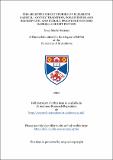Files in this item
The selected short stories of Elizabeth Gaskell : Gothic tradition, forgiveness and redemption, and female friendships in Mrs Gaskell's short fiction
Item metadata
| dc.contributor.advisor | Mallett, Phillip | |
| dc.contributor.author | Nectoux, Tracy M. | |
| dc.coverage.spatial | 170 p. | en_US |
| dc.date.accessioned | 2018-06-29T12:21:37Z | |
| dc.date.available | 2018-06-29T12:21:37Z | |
| dc.date.issued | 2002 | |
| dc.identifier.uri | https://hdl.handle.net/10023/14749 | |
| dc.description.abstract | This thesis discusses selected short stories by Elizabeth Gaskell. It focuses on three main ideas: the use of pagan traditions and the importance of names in her gothic tales (Chapter One); the incorporation of her Unitarian beliefs in stories depicting spiritually and sexually "Fallen Women" (Chapter Two); and the various types of female friendships found in her short fiction (Chapter Three). Chapter One explores the way Mrs. Gaskell draws on pagan myth and traditions in her gothic stories, and the significance of particular-names. It draws attention to a less familiar aspect of her work, the description of extreme states of mind in a Gothic framework. Chapter Two explores Mrs. Gaskell's Unitarian background in relation to her many short stories about forgiveness and redemption. It also discusses her analysis of the limits of forgiveness, and the emotional and spiritual dangers of unconditional forgiveness, particularly with reference to "Morton Hall" and "The Crooked Branch." Chapter Three focuses on female friendships in Gaskell's short stories, written at a time when such critics as Eliza Lynn Linton had dismissed women's capacity for friendship. I argue that Mrs. Gaskell proves these critics wrong, but also that she does imagine frightening, dangerous friendships, such as that between Victorine and Theresa ("Crowley Castle"). These unhealthy friendships never appear in her stories set in real, domestic settings, but only in her gothic tales of mystery and horror. In all three chapters, the analysis reveals dichotomies that reflect Mrs. Gaskell's own life, for example as a member of the "rational" Unitarians, who nonetheless believed in the supernatural. The nature of this dichotomy, and the ways in which it reveals itself, forms a link between the chapters, and is a recurrent concern of the thesis. | en_US |
| dc.language.iso | en | en_US |
| dc.publisher | University of St Andrews | |
| dc.subject.lcc | PR4711.N4 | |
| dc.subject.lcsh | Gaskell, Elizabeth Cleghorn, 1810-1865--Criticism and interpretation | en |
| dc.title | The selected short stories of Elizabeth Gaskell : Gothic tradition, forgiveness and redemption, and female friendships in Mrs Gaskell's short fiction | en_US |
| dc.type | Thesis | en_US |
| dc.type.qualificationlevel | Doctoral | en_US |
| dc.type.qualificationname | MPhil Master of Philosophy | en_US |
| dc.publisher.institution | The University of St Andrews | en_US |
This item appears in the following Collection(s)
Items in the St Andrews Research Repository are protected by copyright, with all rights reserved, unless otherwise indicated.

